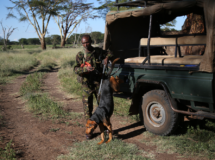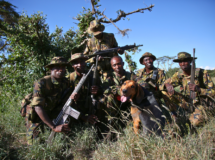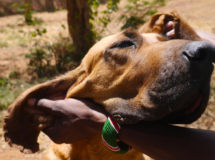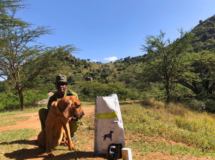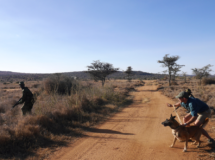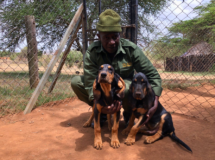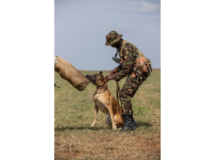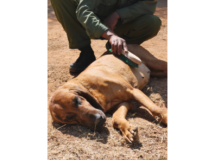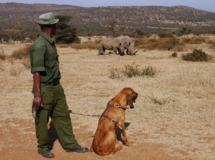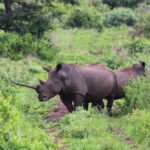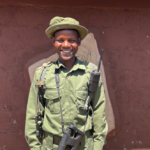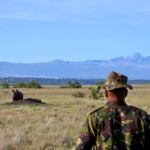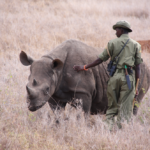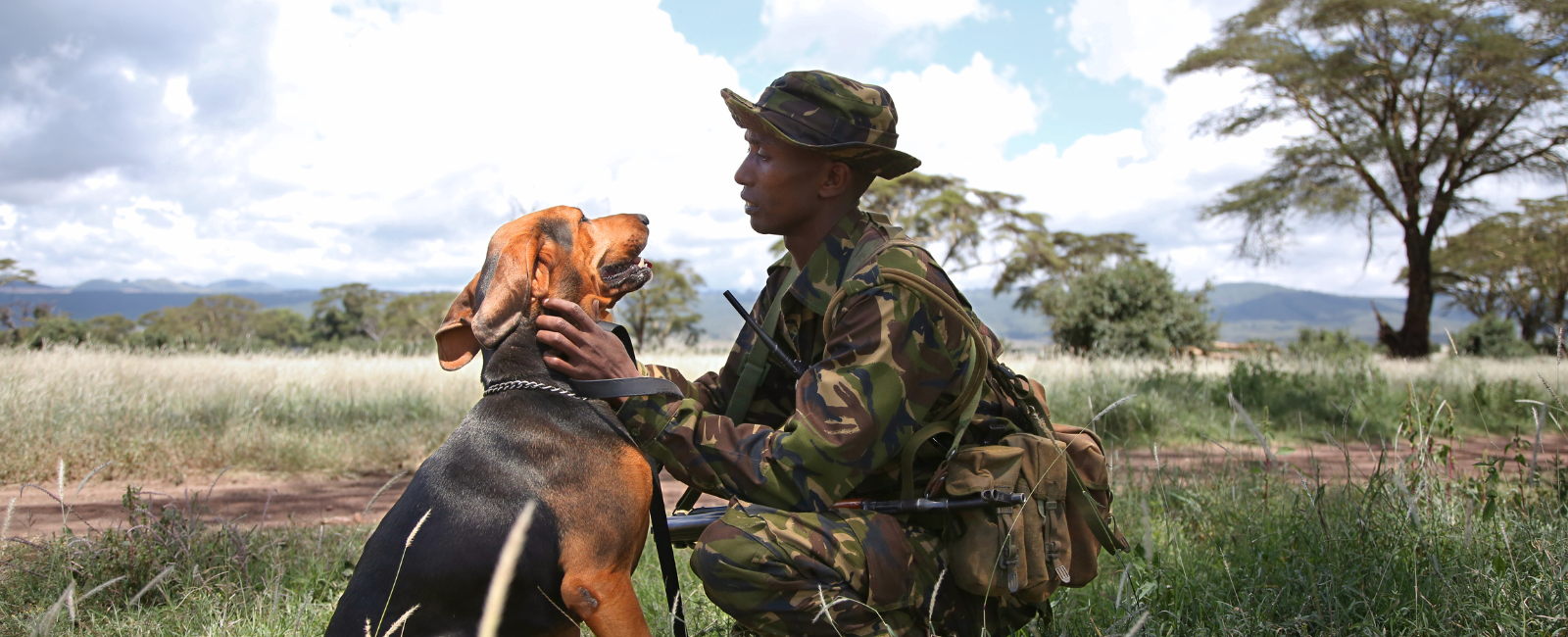
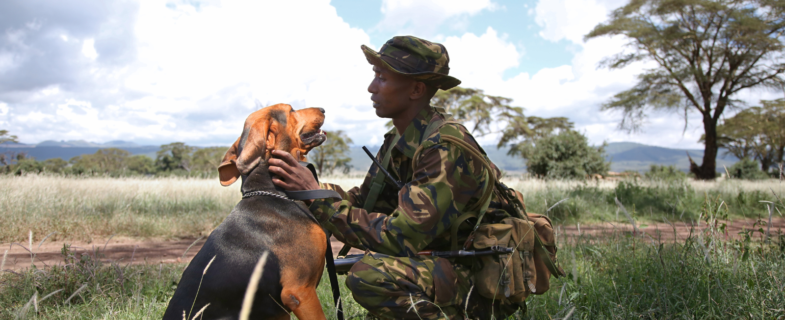
Anti-poaching canine units
As excellent as dogs are as companions, they are also great assets for anti-poaching units across Africa, becoming involved in three key ways: as trackers dogs (such as bloodhounds, bloodhounds x Dobermanns or foxhounds) used to follow scent from a crime scene or detected incursion; as sniffer or detection dogs (Labradors, springer spaniels and cocker spaniels) to search locations such as houses or cars; and as attack dogs (such as Belgian Malinois) used to incapacitate a criminal’s weapon-holding arm to facilitate a safe arrest. These breeds work incredibly well in their designated roles, but anti-poaching units are always open to new innovations and to trying new breeds, including those that are potentially easier to train and transport, and require lower maintenance.
The dogs’ effectiveness has meant that the number of canine units across the African continent is rising, but they are expensive to run and often work in isolation from each other. As a result, opportunities to learn best practice and to meet other teams can be limited. Since 2018, to address this challenge, we’ve helped to fund, coordinate and facilitate workshops in South Africa, Kenya, and Zambia, bringing canine teams and experts together. In addition, we support the operational costs of several units that are integral parts of our partners’ anti-poaching efforts.
Our partners and their dogs have seen significant successes at reducing poaching, as well as addressing other crimes such as theft, cattle rustling and kidnapping. In fact, the offspring of many of these dogs have also been trained, and since moved on to form new K9 Units at other conservancies, including the Sera Community Conservancy, which received its first black rhinos in 2015.
In terms of the dogs’ well-being, it’s crucial that handlers know their dogs inside and out. K9 Units have to consider the best time of day for training, the local climate, and which dogs are best in certain scenarios, i.e., whether an individual dog is best suited to tackle a case that occurred in a highly populated built-up area or out in the bush.
The problem
Poaching and wildlife trafficking are lucrative forms of transnational organised crime, decimating populations of rhinos and other wildlife across Africa. To counter these threats, we’ve got to use every tool in the toolbox, deploying as many strategies as possible to keep rhinos safe.
With their incredible senses, loyalty, and training ability, dogs have proven to be highly effective team members, helping law-enforcement teams to reduce crime all over the world. When it comes to conservation, particularly in anti-poaching efforts, the situation is no different.
Working closely alongside their handlers, dogs can track a poacher’s scent for miles, as well as detect illegal wildlife products found in vehicles and homes. These talents give teams the ability to find and stop suspected poachers and traffickers, gaining evidence that can lead to successful convictions.
To emphasise just how extraordinary a dog’s nose can be in these settings, the scent on a piece of rag or a sterile wipe rubbed over a footprint can be enclosed in a glass jar under refrigeration for up to six months without losing its potency. Later, in court, when a series of suspects are lined up, a trained and certified tracker dog – independent of any cases conducted on or near to one of the conservancies – can be brought out to match the scent from the jar with that of a suspect responsible for the crime in the line-up.
Beyond their physical skills, dogs have another positive attribute for anti-poaching units: they are completely incorruptible. If they find an illegal substance, they will indicate so, regardless of who the suspect is.
What do these workshops include?
During the four workshops held so far, practical and theory sessions have addressed:
- Canine basics, focusing on: starting and maintaining healthy dog squads, developing kennels, nutrition, veterinary care, enrichment, retirement and physio plans, and emergency first aid in the field
- Handler and dog: improving skills for handlers and their detection and / or tracking dogs, and motivating handlers despite the inevitable challenges
- Using canine evidence: making the best use of evidence found by dogs to assist law enforcement and help successfully prosecute criminals, with an emphasis on the importance of keeping records
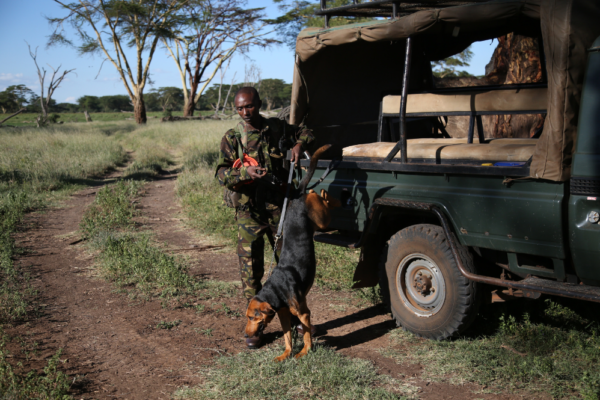
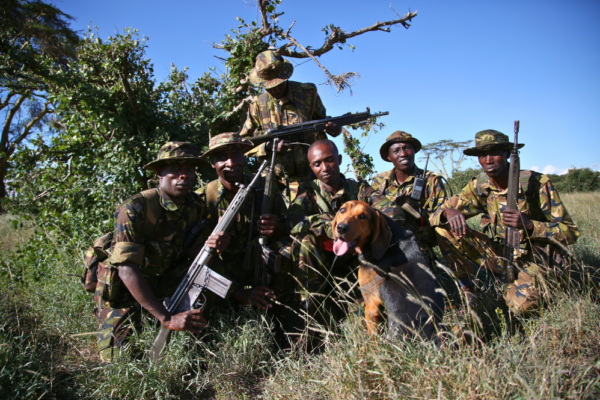
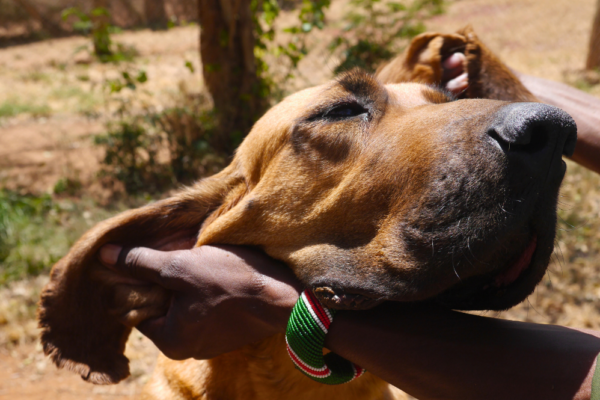
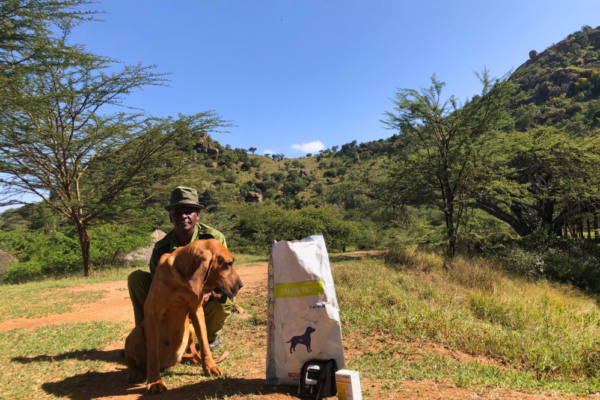
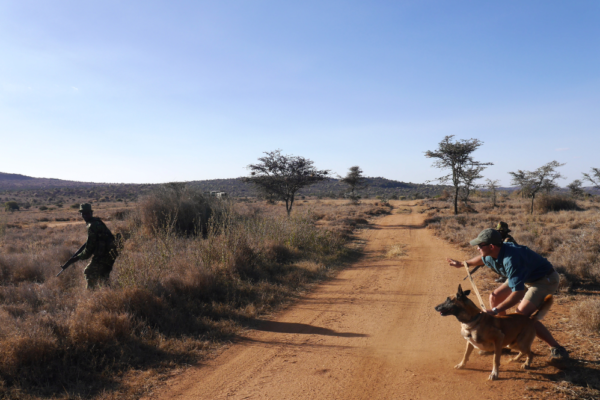
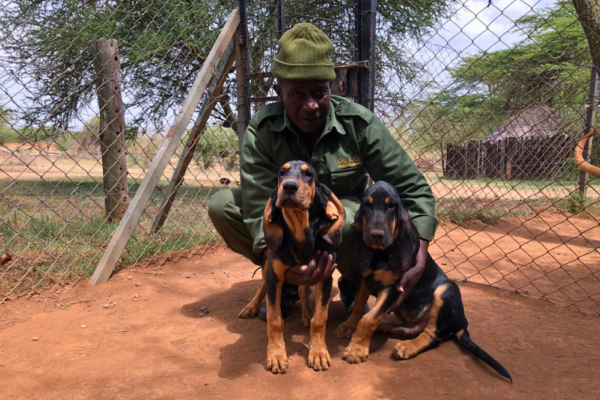
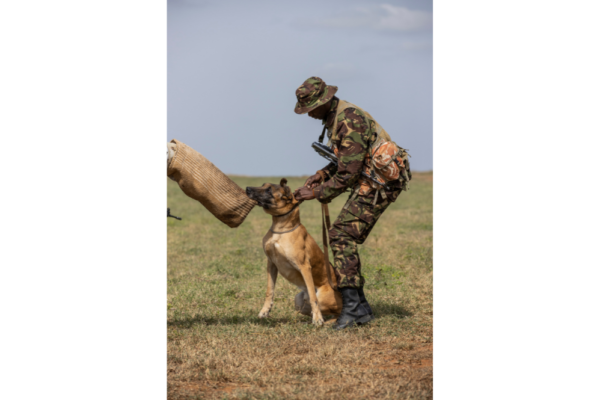
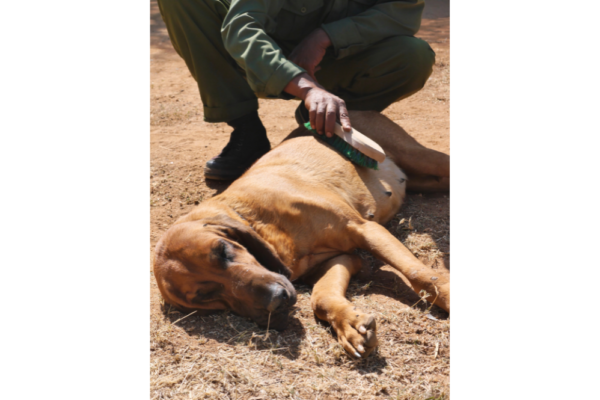
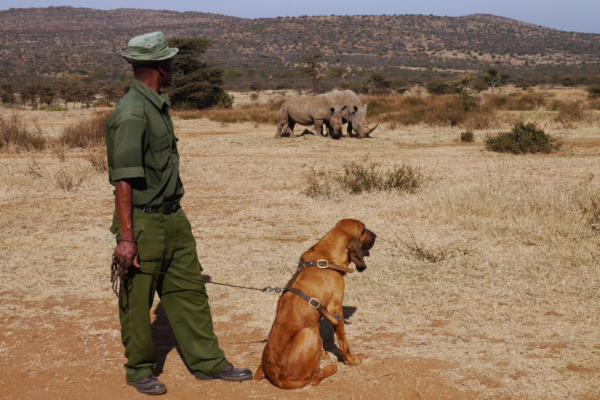
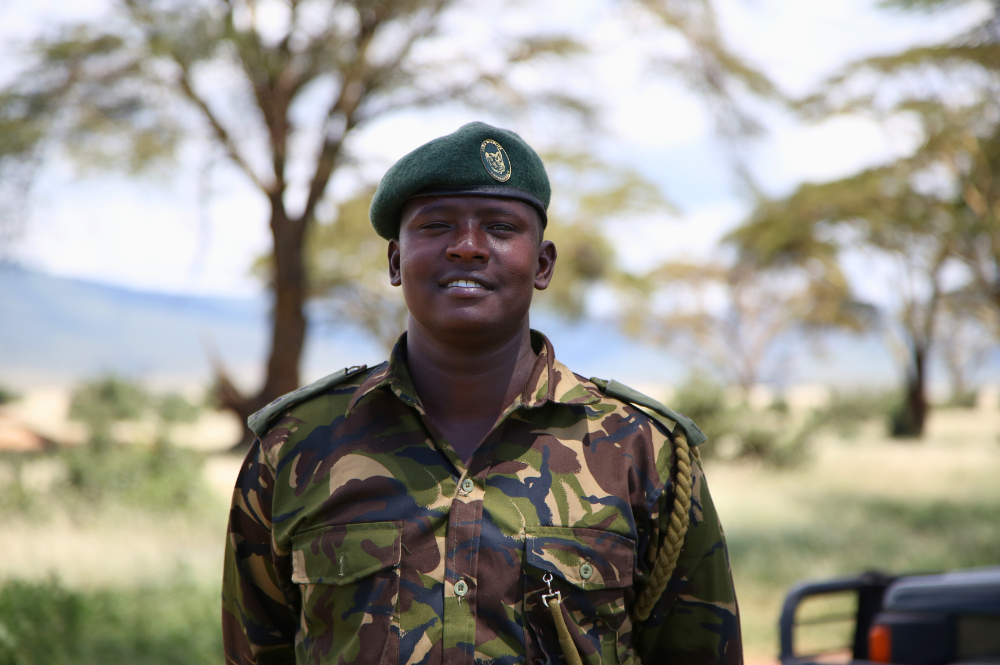
"Dogs are very friendly and a pleasure to work with. They can help us track down and detect bad people, and therefore are an incredibly important tool in our efforts, and we work together as one unit to be even more effective. We are training and improving every day and are grateful for being able to attend the Working Dog Workshop again this year in Nairobi; this is a great opportunity to network, and gain more skills, especially in tracking and law-enforcement work."
Joseph Piroris, Canine Unit Commander, Lewa Wildlife Conservancy
Our work
We support the work of canine units across Africa by lending our logistical and facilitation skills and expertise to organise annual working dog workshops. The workshops bring together canine experts to share knowledge, gain experience and learn techniques to improve dog welfare in the field, boost evidence collection and increase tracking capabilities.
In supporting the annual workshops and canine units, we are empowering and developing anti-poaching units across the continent. Our funds have covered the costs of flights for participants, consultants to deliver the workshop, accommodation, catering, and the workshop venue.
We have also provided funds to cover the operational expenses of various K9 Units, including those operating in Kenya, Namibia, South Africa and Zambia. These have covered repairs to Unit vehicles; training and recruitment of dogs and their handlers; salaries of K9 Unit Coordinators; maintenance of camps; veterinary supplies; quality dog food; travel crates; beds; bowls and toys (lots of toys!)
Previously, through a grant from United States Fish and Wildlife Service, we have also provided support with technical expertise via the role of a Regional Canine Coordinator based in South Africa.
Live talk: Protecting Zambia’s rhinos with the canine unit
 Protecting Rhinos
Protecting Rhinos
 Reducing Illegal Horn Trade
Reducing Illegal Horn Trade
 Involving Communities
Involving Communities
 Bringing Experts Together
Bringing Experts Together


